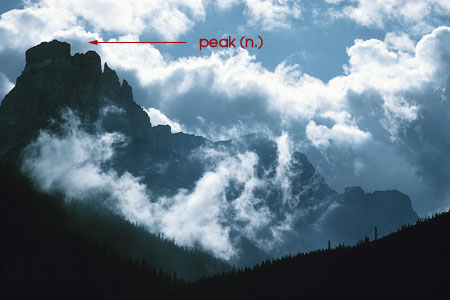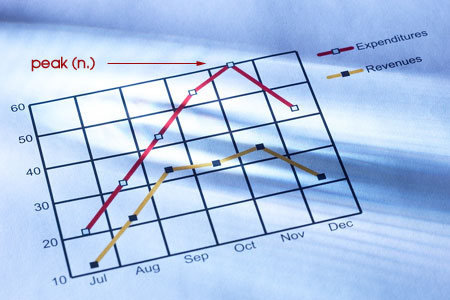Deadly Wordplay #2: Piqued and Picky about Peaked, Peeked, and Piqued
I have more than one pet peeve about writing. The misuse of the words peaked, peeked, and piqued is one of them. Other than the fact that they are homophones, I don’t understand why perfectly capable writers and editors miss these every now and then.
Peaked
…is the past tense of the verb to peak. The noun version of the word looks like this:

or like this:

The use of the verb version of the word, which means to reach a maximum, can be demonstrated in the following sentences:
Mt. Everest peaks at 29,028 feet above sea level.
Our expenditures peaked in November at the number 60.
Peeked
…on the other hand, is best demonstrated with this picture:

He is peeking around his book to take a peek at you. There is no way in hell he is peaking. He just doesn’t look all that excited yet. If he were reading an erotic romance book, and if he were peeking at you while you were getting undressed, then yeah, he might be peaking, too—or rather, his excitement might be peaking—but in my experience, men in the peak of their excitement and arousal have a much less placid look on their face. Trust me. He’s just peeking.
Piqued
…however, isn’t quite as easy to illustrate. To pique is to arouse or excite a range of feelings within a person, from anger and resentment to curiosity and interest. I am piqued, for instance, about the misuse of these three words. How people can mess these up has piqued my curiosity.
That said, there are slight, subtle differences between the noun version of the word and the verb version of the word.
This girl, here, has pique:

This girl, here, has her curiosity piqued:

Can you spot the difference? Here’s a clue.
In the first one, at the peak of her pique, she throws the box at you and throws a tantrum.
In the second one, when her piqued curiosity later peaks, she peeks in the box and finds it’s only a bunch of socks and underwear, which leaves her in a fit of pique … and THEN she throws the box at you and throws a tantrum.
Okay, so not much difference at all, but there you go—peaked, peeked, and piqued.
Don’t go messing them up, or I’ll be piqued. And not in a good way.
Share this post:
15 thoughts on “Deadly Wordplay #2: Piqued and Picky about Peaked, Peeked, and Piqued”
EEK! I know my book is on your reading docket and now my curiosity is piqued as to whether or not it was my book that peeved you off!
I enjoyed the grammar lesson, I knew that stuff but I still could mess it up on occassion….hopefully not anymore. 🙂
Very nicely done, April. I love the visuals, they really helped bring things to life, so to speak, that is. ~smiles~
Paige, I haven’t started reading it yet, but since it’s in editing, anything a little off wouldn’t bother me anyway. 🙂
Amen, sister.
so what you’re telling me is pique isn’t french for peek?
[oi! I’m such a literary train wreck]
LOL, according to Babelfish, pique is French for prick, which, now that I think about it, is actually appropriate. When someone piques your interest, it’s almost like they prick it.
Very good – and of course there are those that misuse their, there, and they’re. These words are probably not as badly abused as the ones you mentioned, but then again, they are more commonly misused I think. The two that bother me the most are its and it’s.
Mark
Mark, those are my pet peeves as well, but they’re much harder to illustrate with photos, lol.
Thanks, you straightened that out for me.
Now, my pet peeve is the use of less and fewer. Journalists make this mistake frequently (as does the general public). If you can count it, then it is fewer, ie. She has fewer cups of flour than he does. But, if you cannot count it, the correct word is less, i.e., “She has less flour than he does”.
What about the phrase “I’m feeling piqued,” (pronounced pique-ed), which means feeling under the weather, tired, or otherwise not quite right? Is this a proper spelling and usage of piqued?
There is another common use of the word ‘piqued’ in parts of Northwest Ohio. It is pronounced pee’ – ked. It refers to the way one looks when coming down with an illness, during it, or afterwards. So I suppose it may well be a colloquialism in these parts.
Ray W. Clarke, PHD
Now, why couldn’t something have peaked my interest, as in being the highest point of my interest? I’m just curious as to whether or not peak could be used instead of pique in situations like this. are they both proper or does pique HAVE to be used?
Kohl, “peaked my interest” COULD be correct if used in the right context. It is usually “piqued my interest” because when people use the phrase, the meaning is that they are suddenly interested, when they weren’t before. So it’s not a matter of highest point of interest — it’s that first they weren’t interested, or weren’t all THAT interested, and now they are.
For “peaked my interest” to be correct, a person would have to have already been interested, and their highest point of interest would have to be reached — that is extreme curiosity, the kind that kills or the kind that makes the pupils grow large. That’s not usually the context people mean when they use the phrase, since they usually use the phrase at the beginning of interest, just at the point when they start engaging and not when they’ve already been engaged.
Still … it IS possible. For instance:
“As sexy and charming as he is, he piqued my interest when he came into the room and spoke, but he really peaked my interest when he spoke to me specifically about sex.”
Only in that context, I think, could “peak my interest” be right.
Yes, but which do you use for, “She looks a little piqued/peaked/peeked”? I ruled out the third one, actually. Thanks!
Comments are closed.